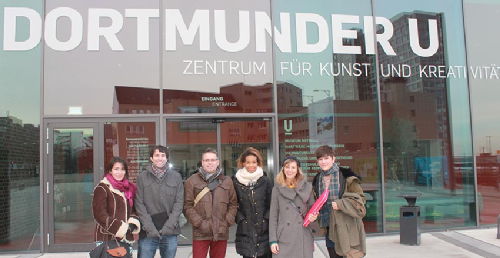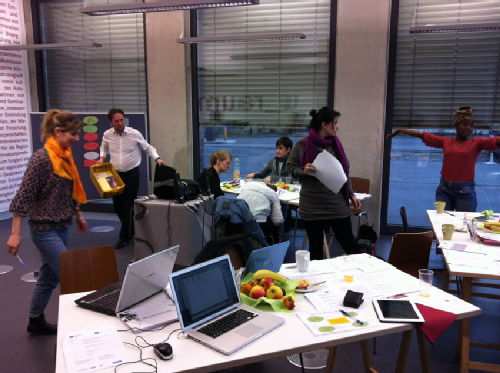CATALYSE – European Centre for Creative Economy
Another late blog entry – I put it up here as this event generated a publication, which will appear in the next few months. Between 13 to 15 February, 2014, a group of Centre MA students accompanied me to a special seminar, hosted by the ‘ecce’ – the European Centre for Creative Economy (based within the complex of the well-known and new contemporary cultural centre, the Dortmund U). The seminar – called Strengthening Culture in Urban Developments in Europe – is one of a short series funded by a EU project called CATALYSE, and part of the new venture called ‘Forum D’Avignon Ruhe’ (along with a third parter, Bilbao Metropoli-30). The Forum D’Avignon (based in Paris) is a leading European cultural policy think tank, and has joined forces with ecce to develop policies for Europe’s leading landscape of innovation and creative industries – the German Ruhr. Ecce are become a leading think tank themselves and have produced many excellent publications (see their LabKULTUR TV website, which I have written for in the past).

Our host was Dr Bernd Fesel, and Bernd and I did the lectures and convened the seminars over three days. The participants were Amina Isa-Maina, Elizabeth Alexandra Hewitt, Federico Maria Di Benedetto, Selina Thea Yasmine S. Welter, Agnesa Topuzyan, Tomi Oladepo. What was the subject? The CATALYSE seminars are designed to produce ideas, concepts and analytical frameworks for evaluating ‘spillover’ – the impacts, influences, and functions of culture in urban economies. This is a big subject, and the backdrop is the growing EU policymakers interest in measuring and evaluating the cultural sector and creative industries.
In the EU culture is becoming a major driver for urban development and the daily quality of life. From the EU structural funds 2007 – 2013 more than 6 Billion Euros was spent on culture. Still, investments in culture are viewed by policymakers in the EU with some scepticism, despite a lot of empirical evidence to the contrary. This perception gap was the motivation for CATALYSE, in part a way of preparing the ground for a larger project, providing more robust evidence and new evidence models for EU policy circles.
The seminar was held in the ‘U_raum’ of the spacious ecce offices. It began with general questions, like ‘how do we talk about culture and creativity outside the usual established historical discourses, or even outside new discourses of innovation management or the cultural studies of creative industries? How can we articulate the ways in which culture and creativity breach the boundaries of specialist practices within the arts, cultural sector or creative industry sub-fields, and impact or are used in other areas of social or industrial activity?’ The seminar gradually made its way to more specific problems on ‘How do we define the factors involved in ‘impact’ or the uses of ‘culture’ in the generation of non-cultural value? How can these factors – soft or hard – be measured? Which tools are necessary to raise awareness for the hitherto little-discussed effects of culture and urban change and how do you fill these ‘perception gaps’?’

The Aims of the CATALYSE workshop were defined in advance in terms of informing current research on the spillover effects of culture and creative industries, (especially in urbanism), and extending the debates on qualitative and quantitative indicators of spillover effects. The method of workshop organisation was semi-structured, open ended, mixed-method approach, albeit class-based. There was one excursion around the adjacent Dortmunder U cultural centre, which informed our discussion on the arts sector. The seminar space was a multi-purpose room with all the usual resources. Students usually worked in two groups, on two tables, with moderators (four) moving in and between the groups. The structure of each day was focused around theoretical viewpoints, case studies and specific questions directed at the group by both Dr Fesel and myself. The structure of the investigation was intentionally dialogic and open ended – development through an informed dialogue between moderators and student participants – and cumulative, where specific instruction style lecture, then case study discussion, punctuated the day’s schedule.
Of course, the issues were difficult and so we were not expecting students to come up with straight solutions. They did, however, come up with a lot of interesting new criteria for thinking about the nebulous contextual realms of culture – the paper will be published by the ecce, as I said above, in the next few months. The CATALYSE seminars, however, were a preface to a larger project, discussed among a room of 20 leading young cultural policy researchers at the April 2014 meeting of the Forum D’Avignon Ruhr in Essen. I moderated the meeting, and for three hours we prepared the basis for a major EU-wide research project on ‘creative spillover’. The leaders are ecce’s Bernd Fesel, and Arts Council England’s Head of Policy and Research, Richard Russell. They both have an excellent grasp of the kind of project needed to spearhead some cultural policy advocacy in Brussels. Constructing this project is ongoing, but with seed funding we hope to start this autumn.
 Jonathan Vickery
Jonathan Vickery


 Loading…
Loading…
Add a comment
You are not allowed to comment on this entry as it has restricted commenting permissions.